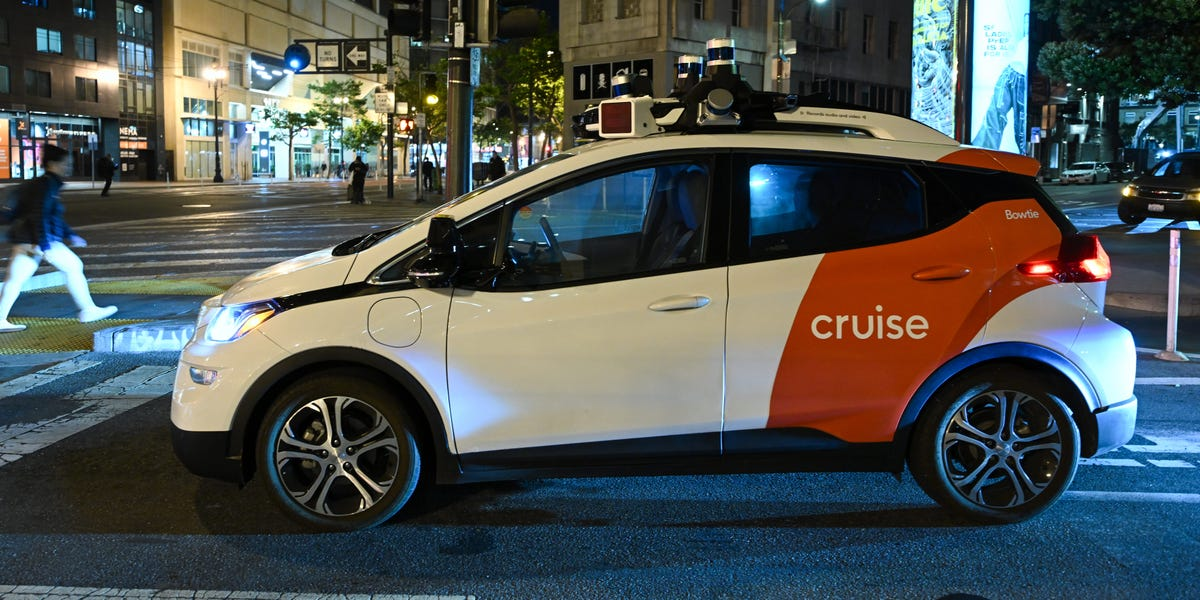A driverless car in San Francisco drove right into wet concrete and got stuck after seemingly mistaking it for a regular road: ‘It ain’t got a brain’ / The site had been marked off with constructio…::The site had been marked off with construction cones and workers stood with flags at each end of the block, according to city officials.


I’m not sure your second point is as strong as you believe it to be. Do you have a specific example in mind? I think most vehicle problems that would require an emergency responder will have easy access to a tow service to deal with the car with or without a human being involved. It’s not like just because a human is there that the problem is more easily solved. For minor-to-moderate accidents that just require a police report, things might get messy but that’s an issue with the law, not necessarily something inherently wrong with the concept of self driving vehicles.
Also, your first point is on shaky ground, I think. I don’t know why the metric is accidents with fatalities, but since that’s what you used, what do you think having fewer humans involved does to the chance of killing a human?
I’m all for numbers being crunched, and to be clear (as you were, I think) the numbers are the real deciding metrics here, not thought experiments.
And I think it’s 100% true that autonomous transportation doesn’t have to be perfect, just better than humans. Not that you disagree with this, but it is probably what people are thinking when they say “humans do this too”.
https://missionlocal.org/2023/08/cruise-waymo-autonomous-vehicle-robot-taxi-driverless-car-reports-san-francisco/
The fire department in SF has made it very clear that these cars are a PITA for them. They are actively driving through emergency situations, cannot follow verbal instructions, drive over fire hoses, etc.
Fatalities is just the number we have to compare. Self-driving car companies have been publishing a simulated fatality metric for a while now. I totally agree there are other ways to think about it. My point is that AV companies have a narrative that humans are actually bad at driving, and I think this comparison pokes a hole in that story.
I’m not sure, actually. The vast majority of driving is solo trips, so I’d expect not that much? There are some studies suggesting that people might actually use cars more if self-driving cars become a reality:
https://www.wired.com/story/driving-partially-automated-people-drive-more/
And that really gets to the heart of my problem with the self-driving cars push. When faced with complex problems, we should not assume there is a technological solution. Instead, we should ask ourselves to envision a better world, and then decide what technologies, if any, we need to get there. If self-driving cars are actually a good solution to the problem, then by all means, let’s make them happen.
But I don’t think that’s what’s happening here, and I don’t think they are. American cities are a fucking disaster of planning. They are genuinely shameful, forcing their inhabitants to rely on cars, an excessively wasteful mode of transportation, all in a climate crisis. Instead of coming together to work on this problem, we’re begging our technological overlords to solve them for us, with an added drawback of privatizing our public infrastructure.
Also, almost all safety numbers for transportation are meaningless unless normalized to miles driven. They also commented about these issues being “everywhere” then goes on a long diatribe against self driving cars. I rarely see anything about them likely based moreso on the media I consume. They clearly have a bias and the media they consume has likely been tailored to support that. Them seeing many articles on crashes or accidents is anecdotal at best (as it is with me having not seen many articles).
I’m not sure what you mean? All the numbers I used are explicitly normalized by or discussed in the context of distance driven. My comment contains the phrase “miles driven” several times. Docotorws piece that I quote from goes into more detail, again normalized by miles driven.
https://pluralistic.net/2022/10/09/herbies-revenge/
Just saying “humans are good” is a flat statement with no impact. They would need to be better than self driving cars for that to mean anything. The reason this is always pointed out when news pops up of a self driving car having an accident like this, is because those stories don’t make headlines for someone like you to use as an anecdote.
This is where you didn’t normalize to miles. Amplified by the next sentence…
You don’t know the numbers. You just feel strongly about it. That’s not evidence.
Like I said, everything is normalized by miles or discussed inbthe context of distance driven.
We don’t have concrete numbers for the real world cars, but we absolutely have enough to make educated estimates, and those line up with the existing data.
In a few months, the cars had some 55 incidents with emergency services. iirc there were only a couple hundred cars. There are millions upon millions of cars in San Francisco driving orders of magnitude more miles than that, and the emergency services personnel are actively flagging the self driving cars as a serious problem.
I’d obviously prefer to have better real world data. The data that we do have is consistent in showing self driving cars significantly underperform compared to humans per mile driven by several orders of magnitude, as Doctorow mentioned in that piece, and I quoted. That data that does exist is also consistent with the emerging picture, albeit the numbers for that aren’t in yet.
Afaik, there isn’t a single piece of data in existence in favor of self driving cars, but there is plenty against. If you have something to the contrary, lmk, because that would greatly change my opinion. I fucking want a self driving car. They sound rad as hell. But I don’t want to organize our entire society around more big tech vaporware.
User name at least checks out!